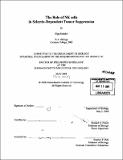The role of NK cells in selectin-dependent tumor suppression
Author(s)
Sobolev, Olga, Ph. D. Massachusetts Institute of Technology
DownloadFull printable version (38.17Mb)
Other Contributors
Massachusetts Institute of Technology. Dept. of Biology.
Advisor
Richard O. Hynes.
Terms of use
Metadata
Show full item recordAbstract
Selectins are a small family of adhesion molecules that are critical for immune cell trafficking. In our laboratory, mice lacking all combinations of selectins have been generated. Previous work from our laboratory has demonstrated that, in the absence of selectins, human tumors transplanted subcutaneously into Rag2'- mice grow significantly larger. This implicates selectins and the innate immune system in tumor immune surveillance. We have extended the xenograft tumor model to immunocompetent C57BL/6 mice. Similarly to previous experiments, we found that many syngeneic tumors grow significantly larger in the triple selectin knockouts (ELP/) than in ELP+' control mice. The difference in tumor growth is most apparent in ELP'- and single L-selectin knockout (L-/) mice. P-selectin also contributes to selectin-dependent tumor suppression, while E-selectin does not appear to be involved. Since selectins are known to play a role in immune cell traffic, we explored recruitment defects in selectin knockout mice, and discovered that natural killer (NK) cell recruitment to tumors in Matrigel is impaired. NK cells in ELP-' and L'/ mice appear otherwise normal and functional. NK cells express L-selectin and selectin ligands, and are known to be tumoricidal. In mice depleted of NK cells, either pharmacologically by TM-P1 antibody injection, or genetically in NK-deficient GrzA-Ly49A transgenic mice, tumor growth is also significantly enhanced. Tumor growth increase seen in the absence on NK cells is not enhanced further by the absence of both NK cells and selectins, arguing that selectins and NK cells may act in the same pathway to suppress tumor growth. The ability of NK cells to clear tumors in selectin-deficient mice is defective. These results suggest that NK cells act to suppress tumor growth in this system and dependent on selectins to do so. Thus, this work contributes to the understanding of the role of selectins and NK cells in the process of tumor immunosurveillance.
Description
Thesis (Ph. D.)--Massachusetts Institute of Technology, Dept. of Biology, 2008. Includes bibliographical references.
Date issued
2008Department
Massachusetts Institute of Technology. Department of BiologyPublisher
Massachusetts Institute of Technology
Keywords
Biology.